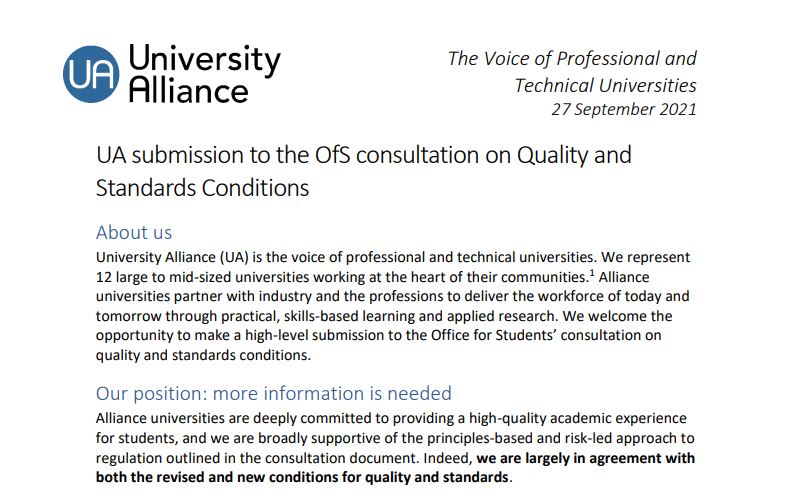Alliance universities are deeply committed to providing a high-quality academic experience for students, and we are broadly supportive of the principles-based and risk-led approach to regulation outlined in the consultation document. Indeed, we are largely in agreement with both the revised and new conditions for quality and standards. However, as a mission group of universities we are unable to lend our support to the proposals without additional information about how they will operate in practice. This is particularly given the extension of OfS regulatory oversight to modular provision, transnational education (TNE), partnership and franchise provision, and non-OfS funded provision such as ITT training and degree apprenticeships. We have serious concerns about the extension of regulatory oversight to these areas and are calling on OfS to undertake an impact assessment of the proposals on partnerships, both international and domestic.
Moreover, the content of Condition B3 and the Teaching Excellence and Student Outcomes Framework (TEF) will not be consulted on until later this year. It is difficult to provide views on the regulatory consequences for breach of these conditions until more information is provided and the future of the TEF decided. We are therefore calling on OfS to develop the full suite of B conditions and TEF as a coherent set of proposals, and delay implementation until they are ready to be rolled out together, preferably no earlier than the start of the 2022/23 academic year.
Areas in which additional clarity is particularly needed include:
- Regulatory thresholds – the level at which investigations will be triggered; what proportion of an institution’s provision would need to be affected before that threshold is reached; and how these patterns will be identified by OfS
- Academic judgments – the process by which expert academic judgements will be sought; how their independence will be guaranteed; and what role they will play in the investigatory process and regulatory intervention
- Contextualisation – the extent to which a consistent approach will be taken across different types of provision and different registration conditions
- Sector recognised standards – where ownership with these standards will lie in the future; how and when will they be updated; and how sector consensus will be maintained
- Professional, Statutory and Regulatory Bodies (PSRBs) – to what extent they were consulted on the proposals; how they will be impacted; and how OfS will ensure dual regulation is not overly burdensome for providers
- Modular provision – which courses and/or modules will fall within this category and how OfS will carry out its general monitoring activities at modular level
- TNE – how this will actually work in practice and what steps will be taken to mitigate the risk of UK HE’s international reputation being affected
Ensuring higher education provision in England is high quality is rightfully a core objective of the Office for Students. However without further information we are concerned that these proposals could have several unintended consequences which could hamper key government priorities around levelling up, international education and lifelong learning – an argument we also made in our phase one submission. For this reason, we are calling on OfS to publish more details and delay implementation until the full suite of B conditions and TEF are finalised.
See our full consultation response here.




